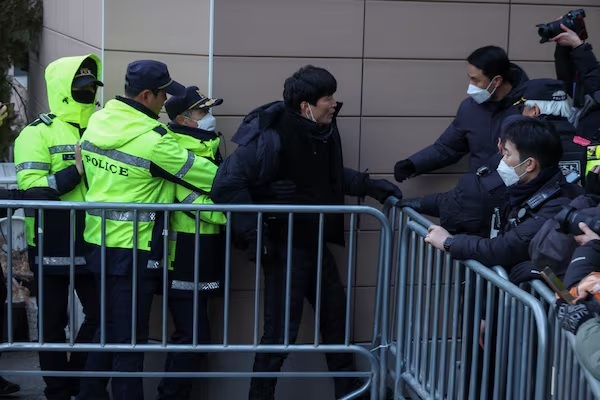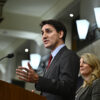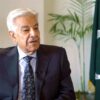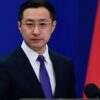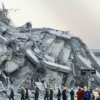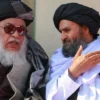Seoul: Hundreds of supporters of jailed South Korean President Yoon Seok-yul stormed a court building early Sunday after his detention was extended, smashing windows and vandalizing the interior, the country’s acting president said. The attack on the leader was called “unthinkable”.
Yoon on Wednesday became the first sitting South Korean president to be arrested as he faces charges of coup d’état related to his spectacular, short-lived declaration of martial law on Dec. 3 that plunged the country into political crisis. put
Soon after the court announced its decision around 3 a.m. local time on Sunday, Yun’s supporters surrounded the building, with heavy riot police trying to hold them back.
Footage shows protesters detonating fire extinguishers at police lines guarding the front entrance, then flooding inside, destroying office equipment, fixtures and furniture.
Police restored order a few hours later, saying they had arrested 46 protesters and vowed to track down others involved.
“The government deeply deplores the unlawful violence … which is unthinkable in a democratic society,” Acting President Choi Sang-mok said in a statement, adding that authorities had stepped up security measures around gatherings. will do
Nine police officers were injured in the chaos, according to Yonhap news agency. Police were not immediately available for comment on the injured officers.
An emergency responder near the Seoul Western District Court said about 40 people suffered minor injuries.
Several of those involved live-streamed the intervention on YouTube, showing protesters littering the court and chanting Yoon’s name. Some streamers were caught by the police during their broadcasts.
Anxiety can destroy evidence.
After refusing to question Yun, investigators facing a deadline to detain the impeached president asked the court on Friday to extend his custody.
After a five-hour hearing on Saturday, which Yoon attended, a judge granted a new warrant extending Yoon’s detention for 20 days, “due to concerns that the suspect may destroy evidence.” is”.
South Korean regulations require a suspect detained on a warrant to undergo a physical examination, take a mug shot and wear a prison uniform.
The leader is being held in a solitary cell at a Seoul detention center. The Corruption Investigations Office (CIO), which is leading the probe, said it summoned Yun for further questioning on Sunday afternoon but the prosecutor-turned-president did not show up again. .
The CIO said he would ask Yoon to come in for questioning on Monday, and that no one but his lawyers would be allowed to visit him at the detention center.
A general view shows the damaged walls of a courthouse after supporters of Yoon stormed the building following a decision to extend the detention of ousted President Yoon Seok-yul for 20 days in Seoul on Jan. 19. – Reuters
Their lawyers have argued that the arrest was illegal because the warrants were issued in the wrong jurisdiction and the investigative team had no mandate to investigate them.
Treason, the crime Yoon could be charged with, is one of the few for which the South Korean president is not immune and could technically be sentenced to death. However, South Korea has not executed anyone in nearly 30 years.
Yun, through his lawyers, said he called the violent incident in court “shocking and unfortunate” and appealed to people to express their opinions peacefully.
“The president said … he will not give up and right the wrong, even if it takes time,” the lawyers said in a statement. Saying that he understood many people were feeling “anger and injustice”, Yoon asked the police to adopt a “stance of tolerance”.
Separate from the criminal investigation that sparked Sunday’s chaos, the Constitutional Court is considering whether to permanently remove him from office or restore his presidential powers, in accordance with the Dec. 14 impeachment by parliament.
However, around 1,000 supporters marched to the Constitutional Court later on Sunday and police arrested three of them, one of whom tried to scale the court’s wall.
Political parties weigh in.
Yun’s conservative People’s Power Party (PPP) on Sunday described the court decision to extend his detention as “very regrettable”.
“There is a question as to whether the impact of detaining a sitting president was sufficiently considered,” the party said.
The main opposition Democratic Party said the decision was a “foundation stone” for reconstruction and that “riots” by “right-wing” groups would deepen the national crisis.
The PPP’s support evaporated after he declared martial law, which he rejected a few hours later after a unanimous vote in parliament.
But since the upheaval — in which the opposition-dominated parliament also impeached his first replacement and investigators thwarted an initial attempt to arrest Yun — support for the PPP has grown sharply.
His party has overtaken the opposition Democratic Party in support — 39 percent to 36 percent — for the first time since August, a Gallup Korea poll showed Friday.
Thousands gathered in downtown Seoul on Sunday morning for an organized rally in support of Yoon. Anti-union protests have also taken place across the city in recent days.

